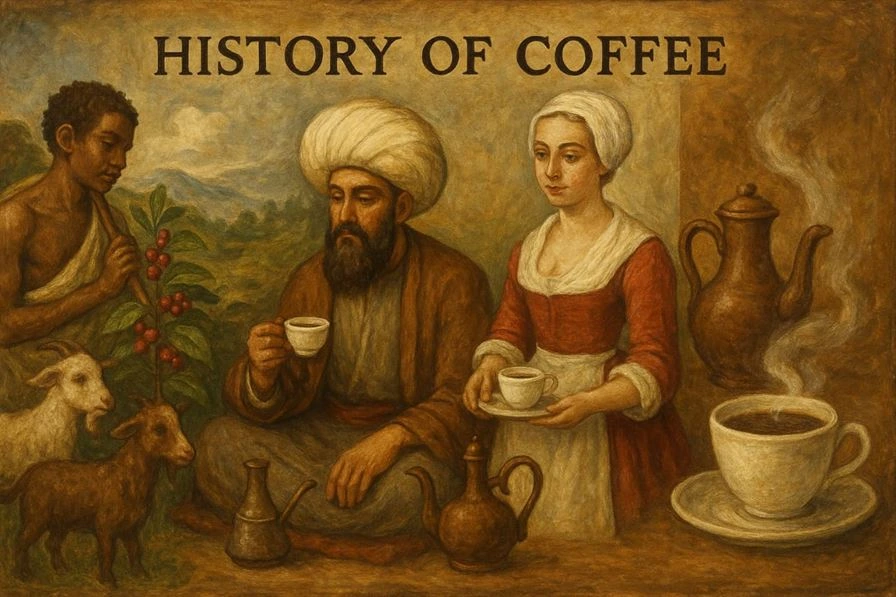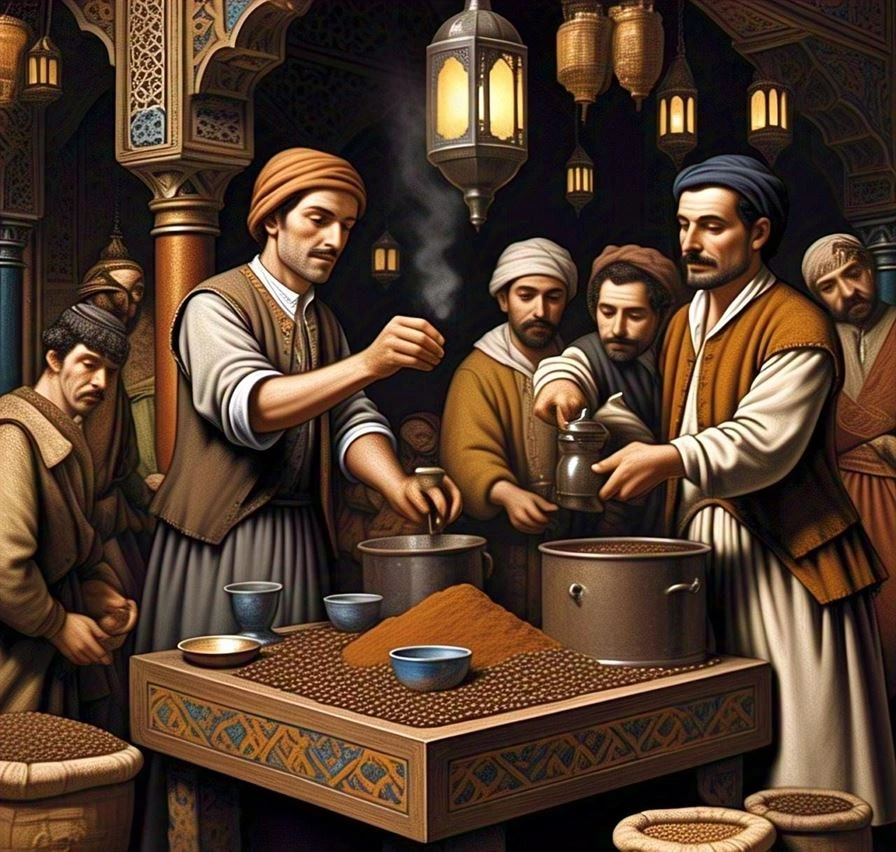A Journey Through Coffee: From Ancient Ethiopia to a Worldwide Obsession ☕🌍
Table of Contents
🌱 Introduction: The Beverage That Transformed Civilizations
Long before coffee shops and latte art filled our lives, one curious goat herder changed history. 🐐 In Ethiopia, folklore tells of Kaldi, a goatherd who noticed his goats bursting with energy after nibbling on some vivid red berries. Intrigued, he sampled them—and unwittingly sparked a global revolution in beverages. ⚡
From Africa’s mountainous forests to modern cafés on every corner, coffee has inspired revolutions, energized mornings, and shaped cultures. Here’s how this extraordinary drink rose from legend to daily ritual. 🌎☕
🏞️ The Origins in Ethiopia: Where It All Began

Most historians agree that Ethiopia is coffee’s ancestral home. In the highlands, the wild Coffea arabica plant still flourishes. The legend of Kaldi gave rise to the first known use of coffee by Ethiopian monks, who used the beans to remain alert during prayer. ⛪🌿
By the 1400s, coffee had traveled to Yemen, where it was first roasted and brewed. The port of Mocha soon became synonymous with the drink, giving rise to the term “mocha” coffee. 🚢
🕌 Sufi Ceremonies and Sacred Brews
In Yemen, Sufi mystics embraced coffee for its invigorating qualities, helping them stay awake during intense religious rituals. ☪️🌙
The drink quickly gained ground across the Middle East, reaching cities like Mecca and Cairo before becoming a staple in Istanbul. Though occasionally banned by religious authorities, coffee was too popular to suppress. 🏛️☕
🛍️ Coffee Crosses into Europe: From Fear to Fascination
When coffee arrived in Venice in the 1600s, some Europeans viewed it with suspicion, calling it “Satan’s drink.” But when Pope Clement VIII tried a cup, he supposedly joked that it was too good to belong to the devil. 😂✝️
Soon, coffee became a sensation. Cafés appeared across London, Paris, and Vienna, turning into hotbeds of thought, literature, and politics. They earned the name “penny universities” since, for just one penny, visitors could sip coffee and dive into engaging, intellectual conversations. ☕🧠💬
📊 Table: Coffee Through the Ages
| Time Period | Historical Event | Geographic Region |
|---|---|---|
| 9th century | Kaldi discovers coffee berries | Ethiopia |
| 15th century | Coffee first brewed in Yemen | Arabia |
| 16th century | Coffee popularized in the Ottoman Empire | Middle East |
| 17th century | Coffee reaches European cities | Europe |
| 18th century | Coffee plantations emerge globally | Tropics |
| 20th century | Espresso and global coffee culture | Worldwide |
🌱 Colonialism and Coffee Plantations
Fueled by European demand, coffee cultivation expanded into colonial territories. The Dutch introduced it to Indonesia, the French to Martinique, and the Portuguese to Brazil, which would become a coffee superpower. 🌱🌍
However, this expansion was often built on forced labor and slavery, especially in the Americas and Caribbean, leaving a dark legacy behind coffee’s golden aura. ⚖️📚
🇫🇷 Enlightenment Cafés: Coffee and Ideas
During the Enlightenment, cafés became hubs of intellectual exchange. In Paris and Vienna, thinkers like Voltaire and Diderot discussed philosophy and reform over steaming cups of coffee. 📖☕
In London, commercial gatherings took place in cafés such as Lloyd’s, which later evolved into Lloyd’s of London, a leader in the insurance world. 🏛️
🇺🇸 Coffee Becomes an American Staple
After the Boston Tea Party, Americans embraced coffee as a patriotic alternative to tea. 🇺🇸📜
In the 1800s and early 1900s, innovations like instant coffee and commercial roasting turned coffee into a household essential, especially in diners, offices, and military rations. ☕🇺🇸
☕ Espresso: Italy’s Game-Changer
Italy revolutionized coffee in the 20th century with the invention of the espresso machine. These compact, pressure-based brewers made way for drinks like the cappuccino, latte, and ristretto. 🇮🇹⚙️
Italian café culture flourished and spread globally, inspiring major brands and changing how people experienced coffee—fast, strong, and social. 🏪
🌍 Third Wave Coffee: A New Appreciation
In the 21st century, coffee entered its third wave—a movement treating coffee as a specialty item instead of a commodity. 🌱✨
Focus shifted to:
- Origin transparency
- Ethical sourcing
- Manual brewing methods
- Elevated coffee preparation and presentation 🎨
Baristas became artisans, and coffee was reborn as a craft.
🧭 Final Thoughts: More Than a Morning Ritual
Coffee’s influence spans continents, ideologies, and centuries. It has served as a fuel for faith, a beacon of thought, and a symbol of comfort across the world.
The next time you brew a cup, think of the monks, mystics, merchants, and modern-day baristas who brought this beverage to your hands. You’re not just enjoying a drink—you’re savoring centuries of human connection. ☕🌍💫

